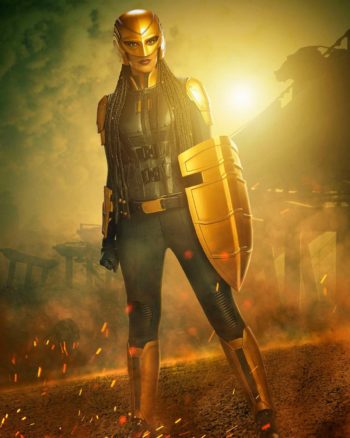Actress Azie Tesfai is accomplished. From her role on “Jane the Virgin” and “Supergirl,” she made history as the first actor in any Greg Berlanti produced series to write an episode on any of its shows. In the last season of “Supergirl,” her character, Kelly Olsen, addressed racial inequality. The final episode aired in November. The first Eritrean/Ethiopian actress to play a superhero EVER, Azie joined “Supergirl” in season 4 as ex-military psychologist Kelly Olsen, a BIPOC and queer character in the DC universe. With writing her debut as the Guardian, Azie got to add some personal touches to the episode, including her character exiting an Ethiopian restaurant with her mother’s name in the opening scene of the episode, an homage to her Ethiopian mother, who had life-long dreams of opening her own Ethiopian restaurant. Azie was also very involved in every element of creating her costume for the Guardian—making sure to utilize the gold of her Eritrean roots.
 Azie Tesfai is best known for playing homicide detective Nadine Hansan in the critically acclaimed, Golden Globe-nominated series “Jane the Virgin,” which ran for five successful seasons on the CW. Since booking her first role in “Wicked Wicked Games,” Tesfai has since landed roles on numerous hit TV shows, including “Silicon Valley,” “Superstore,” “Royal Pains,” “Rosewood,” and “The Real O’Neal’s.” She has also recurred on “Powers,” “NCIS,” and “The Kominsky Method.”
Azie Tesfai is best known for playing homicide detective Nadine Hansan in the critically acclaimed, Golden Globe-nominated series “Jane the Virgin,” which ran for five successful seasons on the CW. Since booking her first role in “Wicked Wicked Games,” Tesfai has since landed roles on numerous hit TV shows, including “Silicon Valley,” “Superstore,” “Royal Pains,” “Rosewood,” and “The Real O’Neal’s.” She has also recurred on “Powers,” “NCIS,” and “The Kominsky Method.”
Tesfai is also the founder and CEO of Fortuned Culture, an accessories line launched with TOMS Shoes Marketplace and sold in Bloomingdales. 100% of proceeds from each piece benefit charities in Ethiopia, Mexico, and Cambodia. Each piece symbolizes the human needs that people desire: health, love, faith, wisdom, balance, and more, and with each purchase, these needs are fulfilled for someone less fortunate.
Chicago Defender: What inspired you to want to write an episode of Supergirl?
Azie Tesfai: I think it was more just that I was inspired to write in general and wanted to tell stories, stories that I hadn’t seen yet. I knew that if I wanted to see those stories, I had to learn how to structure a script. While I had been acting for over a decade, learning the other side of it was necessary, specifically for Supergirl. There was a storyline that I wanted to explore with Kelly specifically. I wrote a sample script and sent it to our showrunners. That’s kind of how I got the opportunity to write. I felt like they were some perspectives that I could offer from my lived experience, which came through in the episode.
Chicago Defender: What was the response by the creative staff to your written episode?
Azie Tesfai: They were supportive. I happen to be close with our writers. They welcomed me into the writer’s room. They understood that that episode was focused on my character, and since I had been playing her for a couple of years and as a black woman, I had a unique perspective. That was a specific voice through Kelly that I felt they honored and heard.
Chicago Defender: That’s the other thing discussed, especially in the last couple of years, the importance of having more people of color and women of color in writing rooms to share those stories. Can you talk about why that’s so important?
Azie Tesfai: Yeah, I think there needs to be representation and diversity in every department. To look around not to see yourself or others represented doesn’t lend to well-rounded storytelling. To write authentically for characters, you have to have a room that reflects that. For my episode, I wrote about my experience through Kelly.
Chicago Defender: Is that one of the reasons that you incorporated so many elements of your personal story, your roots, your culture, and your history into your character. Was that something that you requested, and how was that embraced?
Azie Tesfai: Yes. It’s very important to me. My character is not East African, but I am. I never saw those examples growing up. So, little things like incorporating an Ethiopian restaurant or little cultural accents and adding them to my character felt like a nod to my culture and specifically to girls who may want to be in this business—knowing that I’m trying to provide some visibility and be an example in the best way that I can was important. It’s so much of my identity and who I am as well.
Chicago Defender: What was it like to act in an episode you wrote? Was it weird at times?
Azie Tesfai: It was weird. It was like standing close to a painting. You’re too close to see the whole thing. That’s where, thank goodness, I had David Ramsey as my director. I could trust him because I had no kind of direction of what was up and down. When I would do scenes, I would ask, “Is that good? I sat with this material for so long. I kept thinking I couldn’t forget a line that I wrote. To ask for a line felt silly. It was difficult to have perspective, being so close to the material. I was lucky to be surrounded by people who ensured everything was ok.
Chicago Defender: I cannot imagine acting to the words I wrote. It would be out of my comfort zone.
Azie Tesfai: It was. There were some emotional monologues that I wrote that were cathartic. I was processing some of the trauma I’d experienced as a black woman. There was such an incredible relief of being able to say these things out loud and have clarity.
 Chicago Defender: Now that the series is over, what are your thoughts about Supergirl?
Chicago Defender: Now that the series is over, what are your thoughts about Supergirl?
Azie Tesfai: I loved this role. It was about female empowerment, and it came out in a time with so many male superhero shows. I hope that our young female fans, who are so important to us, remember that women can be powerful, strong and save the world themselves as well. I hope people realize that you have the strength to be your own superhero. You can be a beacon of hope and light and change within your community.
Chicago Defender: Tell me about your Fortuned Culture line. Where did the inspiration come to create these beautiful pieces?
Azie Tesfai: I was the first member of my family born in the United States. Many members of my family were still in Ethiopia and Eritrea. I was raised by a single mom and watched her sacrifice everything. She worked hard to give me all the opportunities that I have, and I was also always well aware that I wouldn’t be able to pursue a career I’m passionate about and have any success if she didn’t come to this country for me to have that opportunity. So I’ve always felt like my purpose was tied to giving back. I wanted to raise money specifically for women and girls in developing countries, focusing on education and vocational training. My mom always taught me that education could never be taken from you as a woman. The Fortuned Culture line is based on my childhood and experiences. It is my way of giving back so much that was given to me.
Danielle Sanders is a journalist and writer living in Chicago. Find her on social media @DanieSandersOfficial.